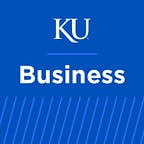Business and journalism students team up on Covid-19 task force
A group of KU students created a campaign encouraging fellow Jayhawks to care about following COVID-19 guidelines.
In order to re-engage students and encourage pandemic safety, KU assembled a group of business and journalism students this spring to build a campaign for students, by students. The brainchild of that team is the “Give a Sh*t Toolkit,” a collection of resources meant to offer students tips on how to have a college experience while staying pandemic-smart.
The School of Business students involved in the project are Meaghan Boyd, Anna Coniglio, Genna Foster, Emily Kruse, Nikita Larson, and Crystal Sivilayvong. The journalism students on the team are Kaitlin Clark, Trinity Krouse, Carissa Low, Naomi Madu, and Hunter Ristau.
Each student joined the project hoping to make an impact on the campus community.
“Every community has been devastated by the pandemic, and the actions college students take affect everyone in the community, especially the most vulnerable,” Larson said. “With so much uncertainty and misinformation out there, it’s also really important for students to have a reliable source for information regarding COVID-19 and vaccines.”
The task force was given minimal structure and administrative guidance. Faculty advisors Kristen Helling and Duane Myer from the School of Business and Janet Rose of the School of Journalism gave the team extensive creative and strategic freedom, allowing the students to create the campaign they wanted.
“The goal was to be from the student voice, so the only appropriate way to have a campaign is for it to be completely student-led,” Foster said.
Research shaped the campaign’s message
With their goal in mind, the business and journalism students began researching effective strategies to encourage masking, social distancing, and vaccinations on campus.
One main inspiration for the campaign was the concept of abstinence vs. harm reduction messaging as it relates to COVID-19.
“Just like abstinence does not work to prevent STIs or teen pregnancy and actually often backfires, messaging to stay home and completely isolate is not effective and could backfire with more people going out and not taking any preventative measures,” Larson said. “We recognized that most COVID-19 messaging from KU, the government, and other officials encouraged complete social distancing and staying home to fully mitigate infection risk. However, for college students, complete isolation is not realistic. Instead, we wanted to offer ways to mitigate risk but still safely see friends, stay connected with others, and have fun.”
Another source of inspiration for the team was Boston University’s “F*ck it Won’t Cut it” campaign. The students gravitated toward the campaign because it was attention-grabbing and the edgy title distanced it from the university.
“We recognized that KU students were tired of hearing the authoritative demand of staying safe, and we approached the overall safety message from a point of view of your peers,” Kruse said. “We followed a similar approach to BU and tried to make our messaging and content as de-institutionalized as possible — a campaign by students, for students.”
With that point of view in mind, the task force developed the “Give a Sh*t” Toolkit campaign. Their social media accounts serve as a collection of resources for students to use to have a college experience more safely. The team believes that if it can encourage students to make even a few safer choices, its efforts will have been worthwhile.
Cross-disciplinary collaboration was crucial to the project’s success
Having both business and journalism students on the team has been beneficial for the creation of the campaign. The unique skills of each student were necessary to perform the various tasks from strategic planning to graphics creation.
“With the business students, there is a clear analytical, more business-oriented mindset and with the journalism students there is a creative mindset that came with design skills as well,” Foster said. “It meshed seamlessly, and I don’t think the campaign would’ve taken off without students from each discipline.”
The group hopes this project will evolve as the pandemic does. After the pandemic is over, the group is considering expanding the definition of “giving a sh*t” to include other campus safety topics like alcohol use and sexual assault prevention. In the meantime, the group will continue to offer KU students resources and credible information about how to protect themselves and their communities from COVID-19.
To learn more about the Give a Sh*t Toolkit, visit them on Instagram and Twitter @giveashttoolkit.
By Meaghan Boyd
